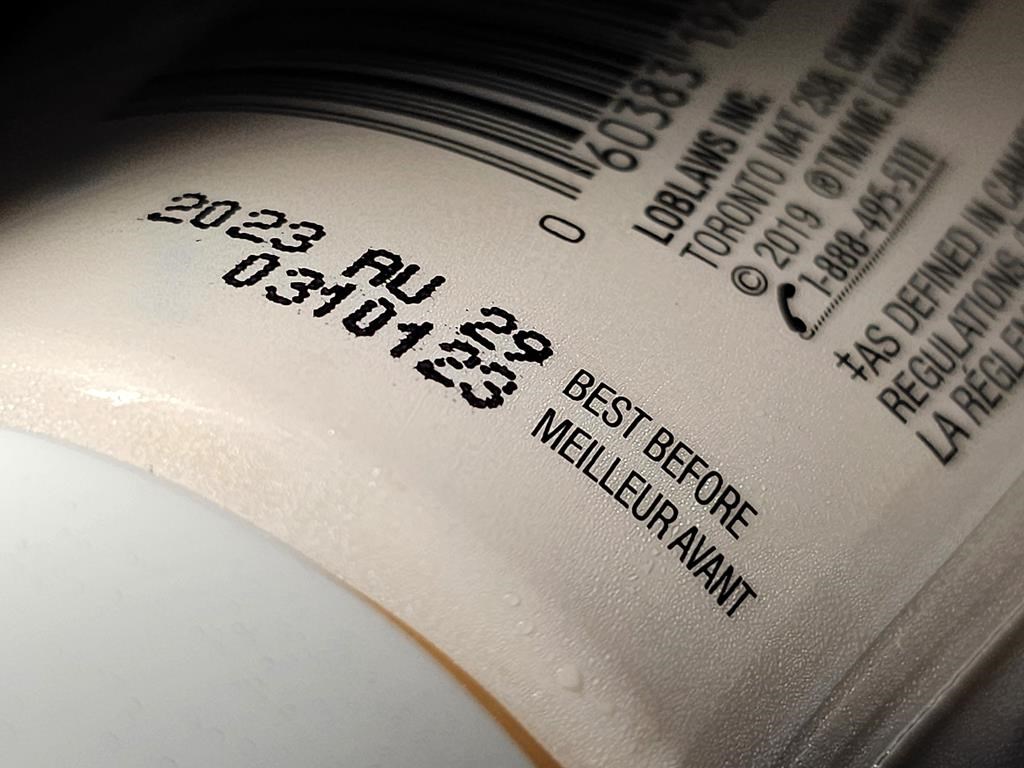Are best-before dates on food necessary? Some food charities say it’s time to reevaluate
By Andrew Benson Global News
Updated July 12, 2023

A "best before" date is shown on a food container in Toronto, Tuesday, July 4, 2023. A report from a House committee is recommending the government take another look at its rules around best before dates in an effort to cut down on food waste.
THE CANADIAN PRESS/Giordano Ciampini. GAC
best-before dates on their favourite foods.

And now, there is a call on the government to reevaluate whether best-before dates on foods are even necessary.
John Bailey, the CEO of the Regina Food Bank, said best-before dates are often intertwined with expiry dates, but the two are very different.
“The idea of a best-before date is about peak freshness and quality control,” Bailey explained. “(With) expiry dates, once it is surpassed, you start to run into potential issues with contamination and the food not being healthy.
Bailey said with best-before dates, depending on the food, there is a large grace period when foods are actually okay to eat.
“Anywhere from a few weeks to several months to even a year or so beyond is when you can still sort of safely … enjoy the food that is past the best-before date.”
For items such as dairy, produce and meat, however, the food can quickly go downhill after the best-before date. Bailey said the safest way to check is to smell the food rather than taste-testing it.
Second Harvest, a Food Rescue Charity in Canada, is raising the alarm on the misconception between best-before dates and expiry dates.
They say the issue is leading to unnecessary food waste and food insecurity. And now, they are calling on the federal government to address it.
“People are throwing food away and people are struggling to put food on their tables, but people are still throwing it away because they think it’s a food safety issue and it’s simply not,” Lori Nikkel, Second Harvest CEO said when discussing best-before dates.
Nikkel said the issue isn’t only happening at a household level, but at all levels of the production train.
“It’s across the supply chain and it is trailer loads of food being dumped because of an arbitrary best-before date,” she said.
With rising inflation, Bailey said more people than ever are turning to food banks, so any changes to the best before dates is a win for them.
“We live in a country that produces more than enough food for every citizen, yet we have seven or eight million people who are facing food insecurity on a daily basis,” Bailey said. “Anything we can do to sort of eliminate waste and get good quality food into people’s hands is bound to be helpful.”
Nikkel said Second Harvest isn’t calling for the removal of best-before dates, but rather a re-examination of what foods require them — something she argues should only be said of a handful of foods, including those that expire.
“We’re asking the government to investigate this,” Nikkel said. “Nobody is advocating for people to eat bad foods. What we would like to do is remove best-before dates on foods that don’t require it.”
best-before dates on their favourite foods.

And now, there is a call on the government to reevaluate whether best-before dates on foods are even necessary.
John Bailey, the CEO of the Regina Food Bank, said best-before dates are often intertwined with expiry dates, but the two are very different.
“The idea of a best-before date is about peak freshness and quality control,” Bailey explained. “(With) expiry dates, once it is surpassed, you start to run into potential issues with contamination and the food not being healthy.
Bailey said with best-before dates, depending on the food, there is a large grace period when foods are actually okay to eat.
“Anywhere from a few weeks to several months to even a year or so beyond is when you can still sort of safely … enjoy the food that is past the best-before date.”
For items such as dairy, produce and meat, however, the food can quickly go downhill after the best-before date. Bailey said the safest way to check is to smell the food rather than taste-testing it.
Second Harvest, a Food Rescue Charity in Canada, is raising the alarm on the misconception between best-before dates and expiry dates.
They say the issue is leading to unnecessary food waste and food insecurity. And now, they are calling on the federal government to address it.
“People are throwing food away and people are struggling to put food on their tables, but people are still throwing it away because they think it’s a food safety issue and it’s simply not,” Lori Nikkel, Second Harvest CEO said when discussing best-before dates.
Nikkel said the issue isn’t only happening at a household level, but at all levels of the production train.
“It’s across the supply chain and it is trailer loads of food being dumped because of an arbitrary best-before date,” she said.
With rising inflation, Bailey said more people than ever are turning to food banks, so any changes to the best before dates is a win for them.
“We live in a country that produces more than enough food for every citizen, yet we have seven or eight million people who are facing food insecurity on a daily basis,” Bailey said. “Anything we can do to sort of eliminate waste and get good quality food into people’s hands is bound to be helpful.”
Nikkel said Second Harvest isn’t calling for the removal of best-before dates, but rather a re-examination of what foods require them — something she argues should only be said of a handful of foods, including those that expire.
“We’re asking the government to investigate this,” Nikkel said. “Nobody is advocating for people to eat bad foods. What we would like to do is remove best-before dates on foods that don’t require it.”
No comments:
Post a Comment